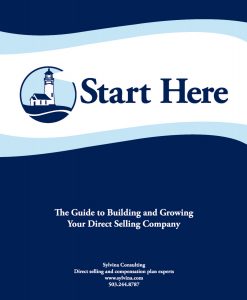 This month, I attended the 2012 Global Regulatory Summit held by the Direct Selling Association in Washington, DC. It is an annual event attended primarily by lawyers and employees of direct selling companies who are responsible for legal compliance.
This month, I attended the 2012 Global Regulatory Summit held by the Direct Selling Association in Washington, DC. It is an annual event attended primarily by lawyers and employees of direct selling companies who are responsible for legal compliance.
In March 2012, the Federal Trade Commission or FTC promulgated a significant new Business Opportunity Rule known as Rule 16 C. F.R. Part 437. Direct selling companies are not specifically or explicitly excluded from this rule.
If your company is subject to this rule, potential buyers of your business opportunity must be given a one-page disclosure statement at least seven calendar days before the prospective buyer signs an agreement or pays any amount of money for the business opportunity.
If you have a direct selling company with independent representatives who recruit others to sell and recruit, anything that slows down the recruiting process isn’t good for recruiters or your company because, during the waiting period, some new recruits will change their minds and opt not to enroll! Fortunately, there are things you can do to not be subject to this new rule.
Before explaining these things, I’d like to tell you about the one-page disclosure statement referenced above. It must include full disclosure of any civil or criminal legal actions that the company or any of its key personnel have been the subject of within the last 10 years (regardless of the outcomes). This means that if your company was sued by an independent representative and you were the prevailing party, you would still need to disclose this legal action. The disclosure statement must also include the names and telephone numbers of at least 10 people who have purchased this business opportunity from the seller. If the seller has sold the business opportunity to less than 10 people, then all of them must be listed. In addition, the person receiving the disclosure statement is notified that if he or she purchases the business opportunity, that person’s identity may be disclosed to future prospective business opportunity purchasers.
Rule 16 C.F.R. Part 437 defines a business opportunity as a commercial arrangement in which:
- A seller solicits a prospective purchaser to enter into a new business; and
- The prospective purchaser makes a required payment; and
- The seller, expressly or by implication, orally or in writing, represents that the seller or one or more designated persons will
- Provide locations for the use or operation of equipment, displays, vending machines, or similar devices, owned, leased, controlled, or paid for by the purchaser; or
- Provide outlets, accounts, or customers, including but not limited to, Internet outlets, accounts, or customers, for the purchaser’s goods or services; or
- Buyback any or all of the goods and services that the purchaser makes, produces, fabricates, grows, breeds, modifies, or provides, including but not limited to payment for such services as, for example, stuffing envelopes from the purchaser’s home.
A new business means a business in which the prospective purchaser is not currently engaged or a new line or type of business.
A required payment is all consideration that the purchaser must pay to the seller or an affiliate, either by contract or by practical necessity, as a condition of obtaining or commencing the operation of the business opportunity. Such payment may be made directly or indirectly through a third party. A required payment does not include payments for the purchase of reasonable amounts of inventory at bona fide wholesale prices for resale or lease.
Providing locations, outlets, accounts, or customers means furnishing the prospective purchaser with existing or potential locations, outlets, accounts, or customers; requiring, recommending, or suggesting one or more locations or lead generating companies; providing a list of locator or lead generating companies; collecting a fee on behalf of one or more locators or lead generating companies; offering to furnish a list of locations; or otherwise assisting the prospective purchaser in obtaining his or her own locations, outlets, accounts, or customers, provided, however, that advertising and general advice about business development and training shall not be considered as “providing locations, outlets, accounts, or customers.”
The first two elements of a business opportunity as defined above clearly apply to you as your direct selling company offers a new business for which a required payment is made. It is the third element that may or may not be relevant, that is, whether your company suggests or provides customers or lead generating companies to the purchasers of your business opportunity.
Some direct selling companies provide leads to their representatives or suggest the use of lead generation companies. If a company refers prospective customers or representatives to existing representatives, will this practice cause a direct selling company to be subject to this new business opportunity rule? If a company has a relationship with a lead generation company and encourages its representatives to buy leads from this third party, will this similarly be a problem? Does it matter whether these practices are disclosed by your company to new representatives at the time they join? Does the number of leads provided as compared to the total number of new customers or representatives enrolled have any relevance? If leads are given only to representatives who have achieved a specific rank or higher in your compensation plan, does that matter?
Party plan representatives may offer a hostess who signs up on the night of the party to be a consultant the opportunity to be credited with this party as her own, that is to say, she may offer the party and its customers and sales to the joining consultant as an incentive to purchase the business opportunity. Could this practice cause the party plan company to be subject to the new business opportunity rule? If a company doesn’t encourage this practice, does that make this practice irrelevant to the business opportunity rule?
I wish I could tell you the answers to these questions, but I can’t because the rule is new and we just don’t know exactly how it will be interpreted and enforced. With this information, you can choose to change nothing and just wait and see what happens, or you can take steps now to respond to the new rule in town. The most conservative approach would be to (a) not recommend the use of lead-generating companies, (b) not provide leads or customers to representatives, and (c) not suggest that representatives “gift” a party to a hostess. All of these steps are achievable, although they may be a change to how you’re doing business today.
If you’re uncertain as to what to do, and you don’t have a competent MLM attorney, we can refer one to you. Call Jay or Victoria at Sylvina Consulting at 503.244.8787.
—
Jay Leisner is the President of Sylvina Consulting. For 26 years, Jay has improved network marketing and party plan direct selling companies in many ways. Compensation plan design, business performance reviews, and software consulting are three of Sylvina’s specialties. For a FREE confidential initial consultation, call 503.244.8787 or visit https://www.sylvina.com.

 Jay Leisner, the President of Sylvina Consulting, is a top compensation plan and direct selling expert, a trusted adviser to new and established network marketing and party plan companies. For more than 30 years, Jay has enjoyed assessing and improving network marketing, party plan and referral marketing companies across the globe.
Jay Leisner, the President of Sylvina Consulting, is a top compensation plan and direct selling expert, a trusted adviser to new and established network marketing and party plan companies. For more than 30 years, Jay has enjoyed assessing and improving network marketing, party plan and referral marketing companies across the globe.
Leave a Reply